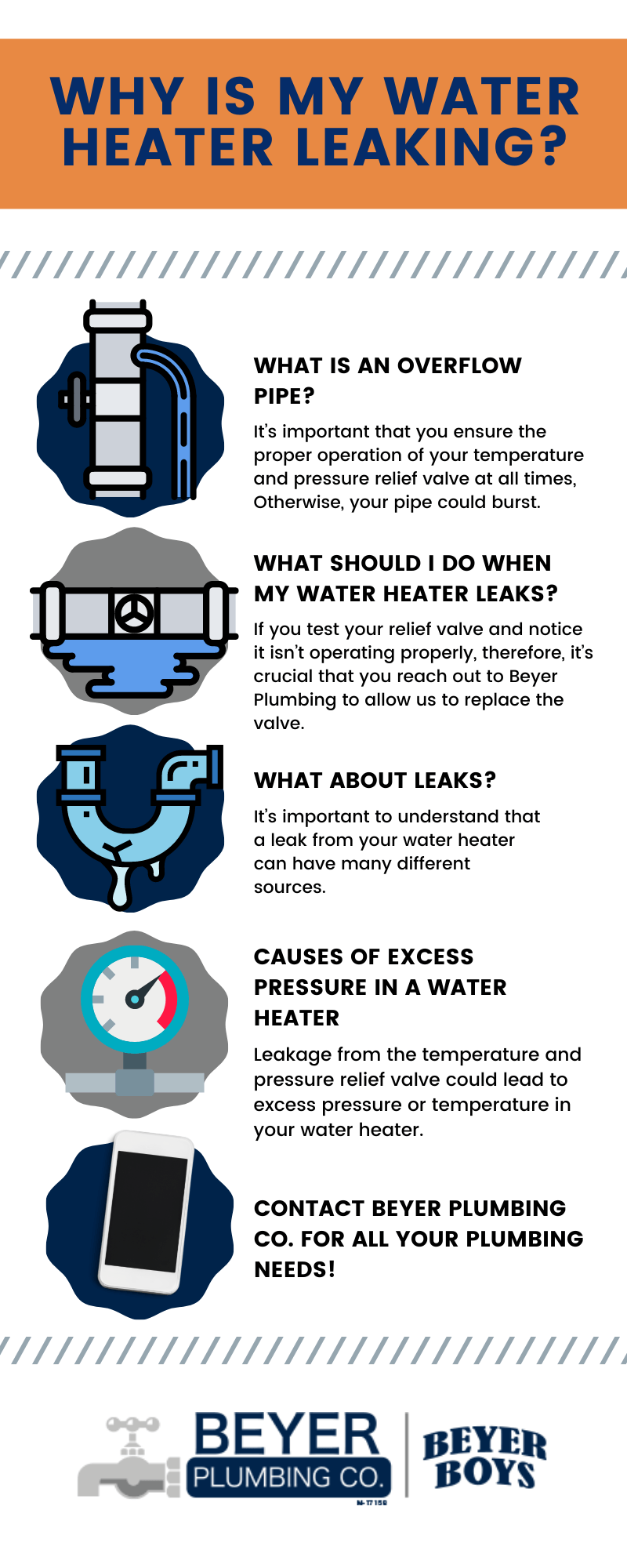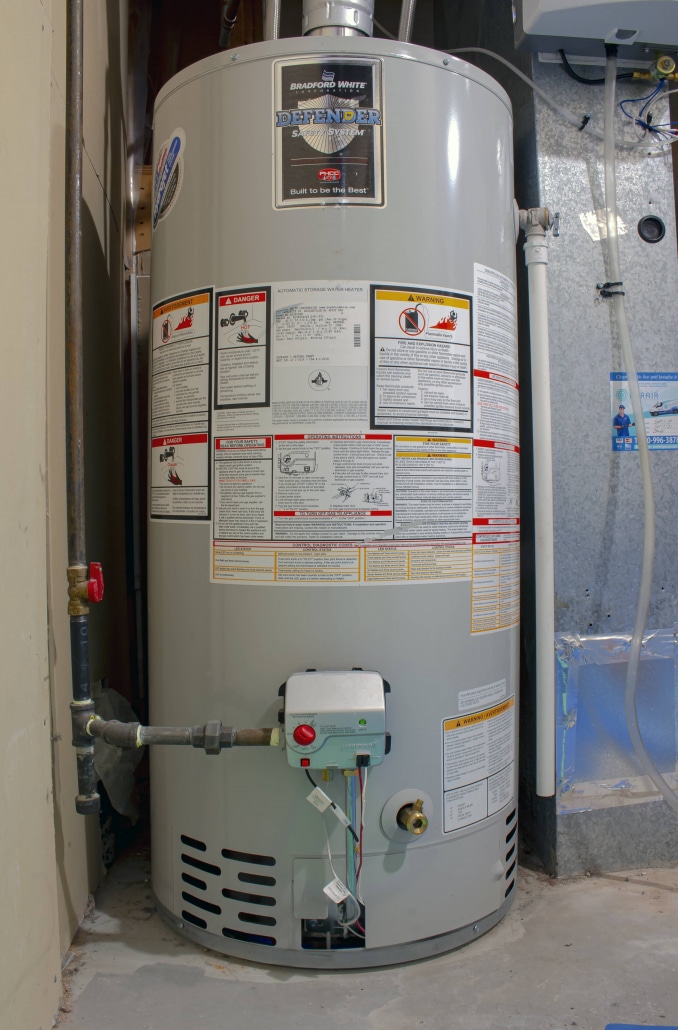Yes, you can still use water if your water heater is leaking. However, it’s crucial to address the leak immediately to avoid further damage.
Water heaters are essential for daily living, providing hot water for showers, dishes, and laundry. A leak can disrupt this convenience and lead to significant issues, such as water damage or increased utility bills. Recognizing the signs of a leaking water heater is vital for homeowners.
Ignoring the problem can escalate into costly repairs or even a complete system failure. Knowing whether to use water during a leak is important for safety and efficiency. This article explores the implications of a leaking water heater and offers practical tips for managing the situation effectively.

Credit: beyerplumbing.com
Page Contents
- 1 Recognizing A Leaking Water Heater
- 2 Immediate Steps When You Detect A Leak
- 3 Water Usage During A Heater Leak
- 4 Risks Of Using Water With A Leaky Heater
- 5 Professional Assessment And Repair
- 6 Preventative Measures For Water Heaters
- 7 Long-term Solutions And Upgrades
- 8 Insurance And Warranty Considerations
- 9 Conclusion
Recognizing A Leaking Water Heater
Spotting a leaking water heater is crucial. Look for water pooling around the base. Rust or corrosion on the tank indicates a problem. Check for damp spots on the floor or walls too.
Several factors can cause leaks. Old age is a common issue. A faulty valve might also lead to leakage. Sediment buildup can damage the tank over time. Poor installation can create gaps, leading to water loss.
Always address leaks quickly. Ignoring them can cause further damage and higher bills. Regular maintenance helps prevent these issues. Keep an eye on your water heater’s condition.

Credit: insideandoutpropertyinspectors.com
Immediate Steps When You Detect A Leak
Detecting a leak in your water heater is serious. Shutting off the power is the first step. This helps prevent electrical hazards. Turn off the breaker connected to the water heater.
Next, turning off the water supply is crucial. Locate the valve on the cold water pipe. Turn it clockwise to stop water flow. This action minimizes further water damage.
After these steps, check for any visible leaks. Use towels to soak up any water around the heater. Stay alert for any signs of flooding.
Consider contacting a professional plumber for repairs. Acting quickly can save you from costly damage.
Water Usage During A Heater Leak
Using water during a heater leak can be tricky. Safety should always come first. Check for electrical hazards. Water and electricity do not mix well. Turn off the power to the heater if needed.
Do not use hot water if there is a leak. This could worsen the situation. Use cold water for basic needs. Avoid using water in areas near the leak.
Monitor the leak closely. Contact a professional plumber as soon as possible. They can help fix the problem and ensure safety.
Risks Of Using Water With A Leaky Heater
Using water from a leaky heater can lead to serious electrical hazards. Water and electricity do not mix well. A leak may cause short circuits. This can result in shocks or fires. Always check for exposed wires around the heater.
Water damage is another major concern. A leaking heater can create puddles or flooding. This moisture encourages mold growth. Mold can cause health problems like allergies. It is important to address any leaks quickly.
Regular maintenance can help prevent these issues. Inspect the heater for signs of wear. Fixing leaks early can save you from bigger problems.
Professional Assessment And Repair
Water heater leaks can cause serious problems. Immediate action is necessary to prevent damage. A professional assessment can help identify the issue quickly.
Finding a qualified technician is crucial. Search for licensed plumbers with good reviews. Ask for recommendations from friends or family. Always check their experience with water heater repairs.
Understanding repair vs. replacement is important. Sometimes, a simple fix can save money. Other times, replacing the heater may be more cost-effective. Get a detailed estimate before making any decisions.

Credit: heartlandheatingandair.com
Preventative Measures For Water Heaters
Regular maintenance of your water heater can prevent leaks. Check the pressure relief valve yearly. This valve helps release pressure buildup.
Flush the tank at least once a year. This process removes sediment that can cause leaks. Always check for rust or corrosion on the tank.
Inspect the pipes for any signs of wear or damage. Replace any worn parts promptly. Use a water leak detector for early warning.
Keep the area around the heater dry and clear. This helps spot leaks quickly. If a leak occurs, turn off the power supply immediately.
Long-term Solutions And Upgrades
Considering a tankless water heater can be a smart choice. These units heat water on demand. This means no more waiting for a tank to fill. They save space and energy. Tankless heaters often last longer than traditional models.
Energy-efficient models are also available. These options reduce energy costs significantly. Look for heaters with high energy factor (EF) ratings. They use less fuel and provide better savings. With these heaters, enjoy hot water without wasting resources.
| Type | Benefits |
|---|---|
| Tankless | Space-saving, energy-efficient, longer lifespan |
| Energy-efficient | Lower energy bills, reduced environmental impact |
Insurance And Warranty Considerations
If a water heater is leaking, you may wonder about your insurance and warranty. Understanding your coverage is crucial. Most warranties cover manufacturing defects. Check your warranty for specific terms. Some policies may cover repairs or replacements.
For insurance claims, gather evidence. Take photos of the leak and any damage. Document dates and costs related to repairs. Contact your insurance provider to discuss the situation. They can guide you through the claims process.
Be aware that some policies have deductibles. Understand what you will need to pay out of pocket. Knowing this helps in making informed decisions.
Conclusion
A leaking water heater can pose risks to your home. It’s essential to assess the situation carefully. Using water while it’s leaking may lead to further damage or safety hazards. Always prioritize your safety. Contact a professional to address the leak promptly and ensure your home remains safe and functional.
